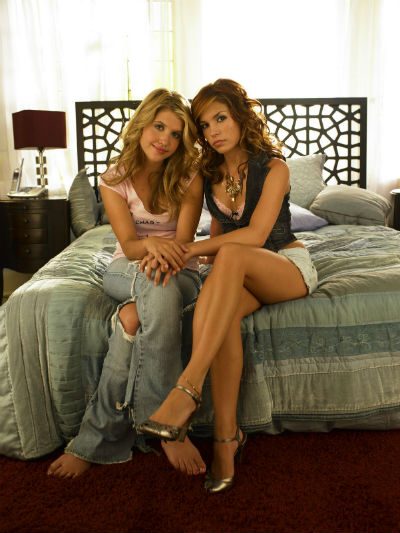In its three years on the air, South of Nowhere was one of the best portrayals of lesbian youth.
I recently rewatched South of Nowhere (which aired on The N between 2005-2008) and was reminded of this. While shows like Degrassi: The Next Generation, One Tree Hill, and The L Word shared its airtime, I think this show came in first in being the most real for young queer women. As someone who just recently finished it, here’s why.
[Disclaimer: This article contains spoilers!]
Sexual Orientation: As I mentioned here I always say this show is where I got the idea that I might like girls. Recently I was introduced to two YouTubers who also had this experience: Shannon Beveridge, who explains that here and Cammie, who explains that here.
While a lot of the show is about the relationship between Ashley and Spencer, who identify as gay, Ashley’s tendencies to go back to Aidan could suggest that her identity is bisexual, and it’s always great to have bivisibility in mainstream entertainment. But with all this said, the show demonstrates a prominent resistance to labels and a concentration on character.
Coming Out: Speaking of sexual orientation, I didn’t mention that a lot of this show focuses on Spencer coming out. This is where the next themes come in.
LGBTQ Youth, Parental Rejection, and Religion: I think in a lot of teen dramas these days, parents are accepting if their children come out as part of the LGBTQ community. However, South of Nowhere premiered in 2005, before marriage equality and some of the more progressive anti-discrimination laws were put in place. In this show, Spencer’s mom caught her and Ashley together, and she eventually came out as gay. It took a long time for her mother to accept that, especially because she saw it as a sin. In the same episode, her mom referred to her as “sick” and tried to bring a therapist over to make her “better.”
Dating and Love: This show depicts many types of relationships, and in many different forms. While obviously giving prominent visibility to Spencer and Ashley, it also shows nonmonogamy between an ongoing love triangle. Abusive relationships also come into the picture with another girl Spencer starts dating; someone who steals from Ashley, and of course there is her verbal abuse. Spencer’s parents’ relationship and the problems they face in their marriage becomes a prime storyline as well. Finally, Spencer’s brother, Glenn, starts dating Chelsea, a black woman, and they represent interracial couples.
High School: In spite of the story complexity presented in South Of Nowhere that might suggest the characters are older, they are actually all in high school. I love that about the show because it shows young audiences the validity of their identities at a young age.
Racial Discrimination: This time watching the show, I totally realized I overlooked the instances where racial discrimination and police brutality were brought into the show. Considering this show premiered in November 2005, it was way ahead of the curve, depicting a pre-Black Lives Matter era and prevalent issues surrounding race and police brutality that we see today and in the years since the show ended. Examples of this include when Clay, Spencer’s adopted brother is pulled over and explains it was because he was “driving while black.” Another example is when Clay suspects he got a bad grade on his paper because of his skin color.
School Shooting: Speaking of Clay, in a drive-by shooting on everyone’s prom night, he gets shot. As in many teen dramas, like One Tree Hill and Degrassi, South of Nowhere has a school shooting that leads into the aftermath of the third and final season. I hate playing oppression Olympics, and I’m not happy Clay got shot, but in case you were wondering, Ashley and Spencer live and do not fall victim to today's "bury your gays" trope.
Finally, one of the best things about this show is that Ashley and Spencer stay together in the end! Even though it’s all lovey and mushy, as someone who isn’t really into that, I really love this show. I think it gives a pretty accurate representation of lesbian and gay women and while it is very dramatic, it is absolutely worth the watch.
About the author:
Jessica Mahmoud refers to herself as Her / Herself. You can read her blog here and follow her on social media on Facebook and Twitter @coloritqueer
